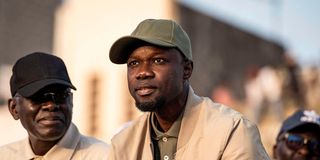Ousmane Sonko: Senegal's fiery opposition leader

Opposition leader Ousmane Sonko (centre) looks on during an opposition meeting two days before his trial, in Dakar, Senegal, on March 14, 2023.
Ousmane Sonko, a rising political star who fired up Senegal's youth, could have his presidential hopes dashed after what he claims was a trumped up legal battle.
The 48-year-old former tax inspector has been sentenced to two years in prison after a lengthy court case that sparked flare-ups of deadly violence in Senegal, usually a bastion of stability in West Africa.
Sonko claims the charges against him -- that he morally "corrupted" a young woman -- were a bid by the government to torpedo his political career ahead of presidential elections next year.
Sharp-tongued and charismatic, Sonko has drawn a strong following among Senegal's youth who love his barbs against the political elite he refers to as the "state mafia".
He has spoken out against debt, poverty, food insecurity, under-funded health and education systems and corruption.
"Theoretically, no politician in Senegal should be very, very rich, because we know, often, where the wealth of politicians come from," he said in 2018.
But he is a divisive character and his critics see him as a rabble-rouser who has poisoned political discourse and sown instability.
Tax inspector to politician
Sonko founded his PASTEF-Les Patriotes party in 2014.
However, he gained prominence two years later when he was fired from his tax inspector job for publicly slamming murky public sector contracts and calling out the political elite.
Sonko took his next step up the political ladder in 2017, when he was elected MP, followed in 2019 by an impressive tilt at the presidential elections.
Running on an anti-establishment ticket against veteran rivals, he came in third with 15 percent of the vote, an unexpectedly strong result for such a newcomer.
With opposition favourite Sonko potentially off the table, Senegal's 2024 election line-up is murky.
President Macky Sall -- who rode to power in 2012 on a wave of anger over his predecessor Abdoulaye Wade's efforts to seek a third term in office -- has refused to rule out a similar move.
Sonko presents himself as a devout Muslim and defender of traditional values -- calling for harsher penalties for same-sex relations.
He has two wives and several children.
Critics in the past have accused him of close association with hardline salafists, which he has denied.
Massage parlour
Debate over Sonko sharpened after he was charged in 2021 with raping a beauty salon employee on five occasions.
Sonko denied all charges against him and said he went to get a massage for a chronic back problem.
He said he asked a preacher if Islam "permitted (a man) to be massaged by women who are not his spouses."
On Thursday, he was acquitted of the rape charges but sentenced to two years' imprisonment for inciting a young person under the age of 21 into "debauchery."
Clashes erupted after his sentencing, leaving nine dead.
"Everyone should rise up as one, because power should remain with the people," Sonko had said before the sentencing.
He called for a "national resistance movement" to defend democracy and freedoms.
When Sonko was arrested in 2021, several days of clashes left at least 12 people dead.
Several more have died in sporadic violence this year.
Divisive
Sonko's approach "is the antithesis of our democratic culture and traditions," said Yoro Dia, one of the president's advisors.
Sonko is stoking the prospect of violence in order to escape justice, Dia said.
He described Sonko as "the Trojan Horse of the Salafists," whose puritan, ultra-orthodox form of Islam contrasts with Senegal's more tolerant Sufi mysticism.
Sonko was born in the restive southern region of Casamance.
Amadou Badji, a 75-year-old pensioner in the region's main town, Ziguinchor, said Sall had been targeting Sonko for the past five years "simply because he raises hope."
But 33-year-old coffee seller Algassim Diallo said that "the country has been taken hostage for the past two years by a tale about rapes... It's time to move on."




